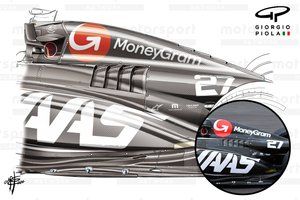Renault axed halo mirror design after Ferrari ban
Renault is re-evaluating how to incorporate mirrors onto the halo device after the design it was working on was outlawed by a Ferrari-induced FIA technical directive.

Photo by: Glenn Dunbar / Motorsport Images








Ferrari became the first team to add mirrors to the halo during the race weekend in Spain, but the design was banned because it featured a winglet atop the mounting.
The Ferrari's mirrors were connected to the halo via a mounting that also had a winglet on top and was weakly connected to the outside edge mirror by a thin piece of bodywork.
Renault's idea was to have one long winglet sprouting from the halo with the mirror attached underneath at the end.
It had a 3D-printed version of the concept in Spain but believes it would be illegal based on the FIA's Ferrari ruling.
"We had a rapid prototyped one running off the halo, but that wouldn't work with the TD so we're looking at a different way of doing a halo-mounted mirror," said Renault's technical director in charge of chassis Nick Chester.
"The reason we were trying an RP one was to check if the drivers could see properly. [Now] we'll have a different go at those."
The FIA has told teams that aerodynamic impact of mirror mountings should be incidental or minimal.
Teams will also need to prove that any device it claims to be a mounting is a "meaningful" part of the structure.
Chester said: "It's always a bit tricky because whenever you've got something in a bodywork box you're always going to find other uses for it.
"I think that the TD [technical directive] that came out recently specified where you could put the stem on the mirror, it has to be the side or underneath.
"That's pretty much cleared it up.
"Having aerofoils that come out and have a tenuous little stay to them - it was unlikely that was going to last very long."
Expert View by Gary Anderson
Being allowed to mount the mirrors off the halo has now opened a whole new can of worms.
As we saw with Ferrari anything that you use will be optimised for aerodynamic reasons and then called a mirror mount.
If the mirror mounts are profiled to help pull that turbulent airflow outwards then it allows better airflow into the airbox and cooling intake.
The worst thing that you can have aerodynamically is a round tube, and basically that is what the halo starts off life as.
It is not the external aerodynamics that suffer most, it is the airbox inlet and in turn the cooling that all those internal ducts feed.
To allow the driver to see past the halo its front section is quite high, almost in line with the intake, and creates the most airflow disturbance in this area.
McLaren and Toro Rosso have a louvred top shroud to help pull the airflow down away from the intake, while other teams have just shrouded it in as good an aerodynamic profile as the regulations allow.
Be part of Motorsport community
Join the conversationShare Or Save This Story
Subscribe and access Motorsport.com with your ad-blocker.
From Formula 1 to MotoGP we report straight from the paddock because we love our sport, just like you. In order to keep delivering our expert journalism, our website uses advertising. Still, we want to give you the opportunity to enjoy an ad-free and tracker-free website and to continue using your adblocker.



















Top Comments